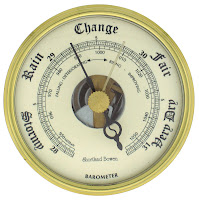Recalibrating Your Barometer
I've always been pretty good at thinking of good analogies to explain some kind of psychological concept, and I came up with this one a couple weeks ago. I was talking with my husband about his overreaction to minor frustrations, like not being able to find something, or finding out that something is broken. And he was explaining to me that he didn't know how to react any other way than to explode, if he was angry about something. Even as he was explaining this to me, he was visibly agitated and shaking, with his eyes wide open!
I said, "So you're barometer is broken."
Now, it just so happens that I'd been doing some research online about hot flashes and night sweats, and it talked about how hormones play a role in regulating one's body temperature, so this was typical for women going through menopause. It was saying that, during this transition, the barometer gets off-kilter and sends incorrect signals to the brain to heat the body, thinking that the person is cold. Okay, so I figured this might be a similar scenario -- Tim's body was sending incorrect messages to the brain to "explode" even though the situation really didn't warrant it.
I went a step further to see how one actually fixes a broken barometer. Most of the advice actually said to throw it out and buy a new one, since it's hard to do (LOL), but I finally found a video of a guy who was explaining that barometers need to be recalibrated if they are moved into a different environment or altitude, so that the measurements stay relative. Otherwise, it's calibrating on incorrect information. So....how would this relate to our emotional barometer?
You know how some people say that we go through major life changes about every 7 years (give or take a year)? Well, I believe this is true -- 7 year spans correlate, more or less, with developmental stages. And I think that it's during those transitions that one needs to figure out if their emotional barometer needs to be readjusted. I'll give an example:
Say there's a 16 year old kid who has an alcoholic father, and this father is very unpredictable with his behaviors -- sometimes he's sweet and nurturing, other times he could rip your head off with his fury. This kid must constantly be on guard and prepared for possible "outbursts" so that he can defend himself and stay safe. This instinct is serving him very well, and it works for him at that time. Now...fast forward 7 years to when he's 23. He's now graduated college and is living with a roommate, maybe dating a nice girl and has an entry-level job at a good company. He's learning some independent living skills and doesn't rely nearly as much on his parents for their support. However, he's still got a very guarded, suspicious, and somewhat hypervigilant personality, which causes him a lot of anxiety and keeps him from having very close relationships. Consequently, he may overreact to anyone who shows anger or uses alcohol excessively, he may mistrust his girlfriend, or he may never want to get his hopes up for something good to happen, because he's wired to believe that Life is incredibly unpredictable and people can turn on a dime.
This instinct isn't working as well, at this stage in his life. And chances are, if he doesn't recalibrate this instinct, he will live an anxious, limited, and lonely life.
My husband Tim used to be in law enforcement, and so he dealt with a lot of knuckleheads who confronted him or defied rules, broke laws, or just acted ignorant and did stupid, dangerous things. His job was very busy and fast-paced, so he didn't have much patience for people who couldn't keep up with him, or who dropped the ball somewhere. He was also married to a woman who's job kept her away from home a lot, and they didn't have any children, so no one was really there to get the backlash of his frustrations when he came home.
His angry reactions might have a little more justified back then (even though I could debate that too, but for all intensive purposes...), but it certainly needs to be recalibrated now. He's no longer in a position of authority like that, he's not responsible for as much as he used to be, and he has a wife and two stepchildren who bear the brunt of his anger when it comes out now.
This hadn't even dawned on him.
Tim admitted to me that he needed to learn how to react in varying degrees of anger, not only because it's no longer fitting his surroundings, but it's damaging things within him -- namely his physical health, his mood, and his ability to connect well with others. This will take time, as the instinct is so ingrained in him, but at least I've brought his awareness to the problem, and he is recognizing when he might be overreacting more.
Going back to the frequent advice to just "throw it out and get a new one", recalibration may be too difficult to do on your own and may need to take place in individual therapy. I can think of several clients I'm working with now, who are going through major transitions in their lives and yet they're still trying to adapt with old patterns, instincts, and beliefs. When old coping mechanisms don't work anymore (or if they are actually causing more problems than they fix), then it's time to ditch them and develop new ones. THAT is the process of recalibration. Pick yourself up and put yourself back down into a different position -- a different perspective, different tools, and maybe with different people, to react to what Life is throwing at you.
I think there really is something to that 7-year theory. Take stock of where you might be right now in that cycle and see if your emotional barometer is still working in the various areas of your life -- family, work/school, relationships, friendships, financial, spiritual, health, etc.



Comments
Post a Comment